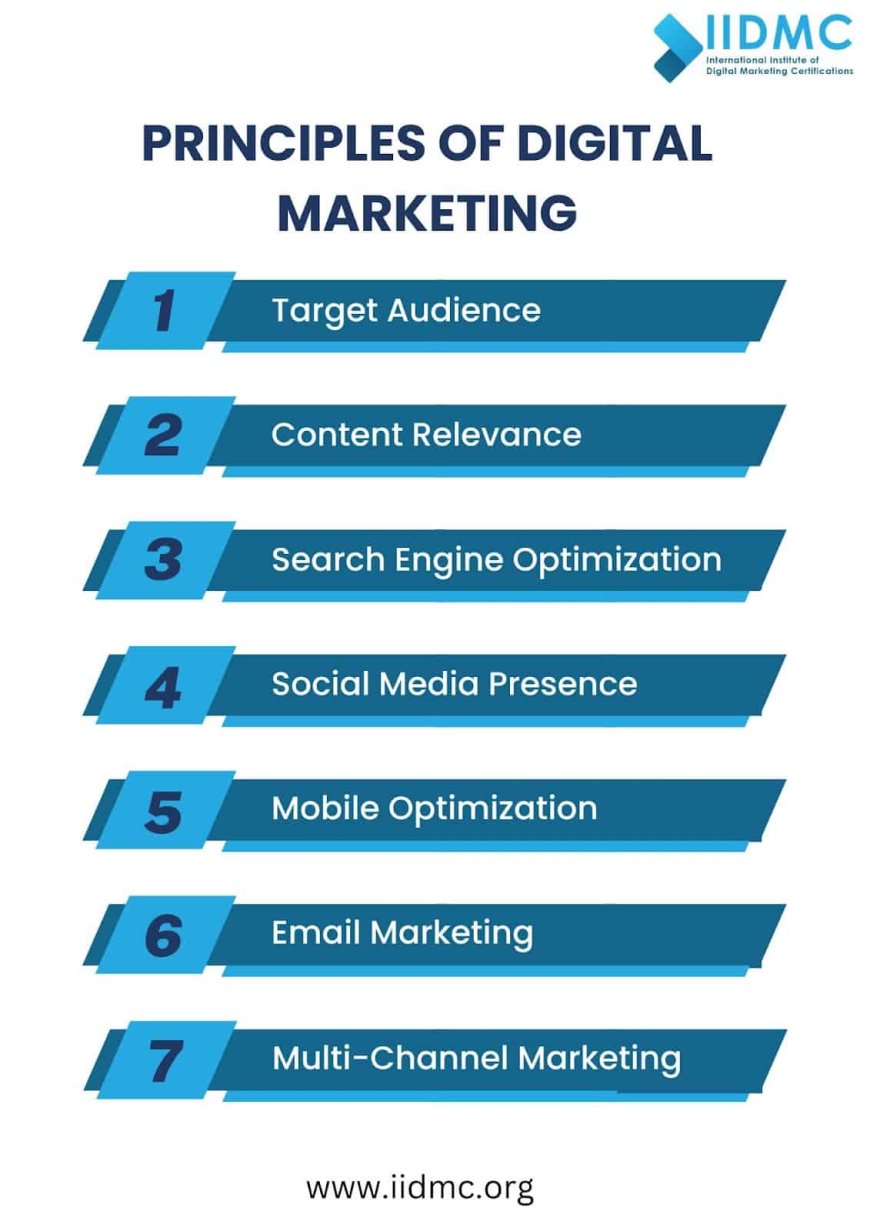Understanding the Basic Principles of Digital Marketing
Learn the principles of digital marketing: strategies, tools, and trends for effective online promotion.

Digital marketing is essential for businesses today with people relying on the internet for information and shopping, having a strong online presence matters. It's a cost-effective way for businesses to connect with their target audience. They can target specific groups, understand what users do, and measure their campaigns' performance. The principles of Digital Marketing play a crucial role in navigating the ever-evolving online sphere. Digital marketing encompasses a range of strategies aimed at promoting products or services through digital channels. One fundamental principle is understanding the target audience, as effective marketing requires a deep understanding of consumer behaviour in the digital world.
understanding the basics of digital marketing is essential. As consumer behaviour shifts online, businesses need to grasp fundamental principles to effectively connect with their audience. From social media to SEO, adapting to the digital landscape ensures a strong online presence, making it a necessity for staying competitive and fostering sustainable growth.
Importance of understanding the principles of digital marketing
Understanding the principles of digital marketing is crucial in today's business world. It serves as the foundation for creating effective online strategies and maximizing the reach of products or services. Digital marketing principles encompass a variety of aspects, such as
-
Targeted Audience Engagement: Knowing your target audience allows for tailored communication strategies. This understanding helps in creating content and campaigns that resonate with the intended demographic, leading to higher engagement.
-
Data-Driven Decision-Making: Digital marketing relies heavily on data analytics. Analyzing metrics like website traffic, conversion rates, and social media engagement provides valuable insights. This data-driven approach allows for informed decisions and continuous improvement of marketing strategies.
-
Multichannel Presence: Digital marketing spans various channels, including social media, email, search engines, and more. Understanding how to leverage these channels effectively ensures a comprehensive online presence, reaching a diverse audience.
-
SEO (Search Engine Optimization): Knowledge of SEO principles is essential for improving a website's visibility on search engines. This involves optimizing content, using relevant keywords, and adhering to search engine algorithms to increase organic traffic.
-
Content Marketing: Quality content is a cornerstone of digital marketing. Understanding how to create valuable, relevant, and shareable content helps in building brand authority, and attracting and retaining customers.
-
Social Media Management: Social media platforms play a vital role in digital marketing. Understanding the nuances of different platforms, along with trends and user behaviour, enables effective communication and engagement with the target audience.
-
Conversion Optimization: Knowing how to optimize the user journey on a website is crucial for turning visitors into customers. This involves streamlining the purchasing process, creating compelling calls to action, and enhancing the overall user experience.
-
Ad Campaign Management: Digital advertising is a powerful tool when used strategically. Understanding how to create and manage online ad campaigns, including setting budgets, targeting specific audiences, and analyzing ad performance, is key to a successful marketing strategy.
Challenges in implementing digital marketing principles
Technological Evolution: The continuous evolution of digital technologies means businesses need to stay updated on the latest trends. Adapting to new platforms, tools, and algorithms requires ongoing education and a proactive approach for effective implementation.
Data Privacy Concerns: Heightened awareness of data privacy issues necessitates careful consideration of ethical data collection and usage. Compliance with regulations such as GDPR and CCPA poses a challenge, requiring businesses to navigate a complex landscape of legal requirements.
Increased Competition: The accessibility of digital marketing tools has led to a saturated online space, making it challenging for businesses to differentiate themselves. Developing a unique value proposition and creative strategies is essential to cut through the digital noise and capturing audience attention.
Ad Blockers and Fatigue: The prevalence of ad blockers and the phenomenon of ad fatigue underline the need for marketers to create engaging and non-disruptive content. Striking a balance between promotional efforts and providing valuable content helps maintain audience interest without alienating them.
Measuring ROI: The complexity of customer journeys, spanning multiple touchpoints, makes accurately measuring the return on investment a significant challenge. Implementing effective attribution models and utilizing advanced analytics tools becomes crucial for assessing the impact of digital marketing campaigns.
Skill Gap: The dynamic nature of digital marketing demands professionals with up-to-date skills and knowledge. Recruiting and retaining a skilled workforce, capable of navigating the ever-changing landscape, is an ongoing challenge for businesses aiming to stay competitive in the digital realm. Continuous training and development programs are essential to address this skill gap.
What are the fundamental principles of digital marketing?
Digital marketing is grounded in several fundamental principles that guide effective online promotion. These principles include

-
Target Audience Understanding: Know your audience's demographics, preferences, and online behaviour to tailor your strategies accordingly.
-
Content Relevance: Create content that is valuable, relevant, and engaging to your target audience. This helps build a connection and encourages interaction.
-
Search Engine Optimization (SEO): Optimize your online content to be easily discoverable by search engines. This involves using relevant keywords, and meta tags, and ensuring the website structure is search engine-friendly.
-
Social Media Presence: Leverage social media platforms to connect with your audience. Consistent and authentic engagement on these platforms can enhance brand visibility.
-
Data Analytics: Regularly analyze data to measure the performance of your campaigns. This enables you to make informed decisions and refine your strategies for better results.
-
Mobile Optimization: With the increasing use of mobile devices, ensure that your digital content is optimized for various screen sizes. Mobile-friendly websites and apps are crucial for user experience.
-
Email Marketing: Utilize email campaigns effectively to nurture leads, retain customers, and provide valuable information. Personalization and segmentation can enhance the impact of email marketing.
-
Conversion Optimization: Focus on converting website visitors into customers by improving the user experience, streamlining the conversion process, and addressing potential barriers.
-
Multi-Channel Marketing: Utilize multiple channels such as social media, email, content marketing, and paid advertising to create a cohesive and comprehensive digital marketing strategy.
-
Continuous Adaptation: The digital landscape is dynamic, and staying adaptable is crucial. Regularly monitor industry trends, technology changes, and consumer behaviour to adjust your strategies accordingly.
Understanding the basic principles of digital marketing is essential for businesses aiming for a strong online presence. From audience comprehension and content relevance to SEO, social media engagement, and continuous adaptation, these principles guide effective strategies. However, challenges like technological evolution, data privacy concerns, and increased competition require businesses to adopt ethical practices, differentiate creatively, and invest in workforce development. Despite obstacles such as ad blockers and measuring ROI complexities, embracing a multi-channel approach, mobile optimization, and conversion strategies remains vital for sustainable growth in digital marketing.





























